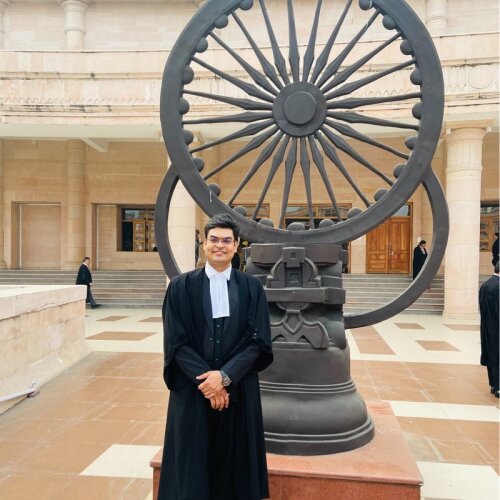Best Private Client Lawyers in Lucknow
Share your needs with us, get contacted by law firms.
Free. Takes 2 min.
List of the best lawyers in Lucknow, India
India Private Client Legal Articles
Browse our 1 legal article about Private Client in India written by expert lawyers.
- Understanding Wills and Succession in India: A Comprehensive Guide for Senior Citizens
- A Will is one of the most meaningful documents an individual can create during their lifetime. It represents much more than the distribution of wealth; it embodies the affection, foresight, and thoughtful planning of the person who leaves it behind. For senior citizens, especially, writing a Will is not a... Read more →
About Private Client Law in Lucknow, India
Private Client law in Lucknow refers to a broad area of legal services designed to address the unique needs of individual clients and their families regarding wealth management, inheritance, succession planning, wills, trusts, estate administration, and personal and family property matters. Given Lucknow's blend of historical legacy and modern growth, individuals often require legal assistance to manage personal assets, structure inheritances, resolve family disputes, and comply with evolving legal requirements. Private Client lawyers help ensure that the legal interests of their clients and their families are secured, both now and in the future.
Why You May Need a Lawyer
There are several scenarios where individuals and families may require the expertise of a Private Client lawyer in Lucknow:
- Drafting and registering wills or codicils to ensure proper distribution of assets after death
- Creating and administering family trusts to protect assets for future generations
- Estate planning to minimize legal complications and tax liabilities
- Advice and representation in probate, succession, and inheritance matters
- Resolving family disputes related to property, wealth, and inheritances
- Handling legal documentation for family settlements
- Legal guidance on gift deeds, charitable trusts, and power of attorney
- Complying with foreign asset declarations for residents with properties abroad
- Representing clients in court in case of will challenges or estate disputes
Local Laws Overview
Private Client law in Lucknow is governed by a mixture of central and state statutes, including the Indian Succession Act 1925, the Hindu Succession Act 1956, the Indian Trusts Act 1882, and transfer of property laws. Key legal considerations include:
- Inheritance Laws: Succession and inheritance depend on the religion of the deceased, with Hindu, Muslim, Christian, and other community-specific laws applying. For example, Hindus are governed by the Hindu Succession Act, while Muslims follow Sharia law and the Muslim Personal Law (Shariat) Application Act 1937.
- Wills and Probate: A will allows for asset distribution as per the wishes of the testator. The probate process validates the will and is conducted in either district courts or the Allahabad High Court at Lucknow Bench, depending on asset value and complexity.
- Trusts: Clients can establish private or public trusts under the Indian Trusts Act for asset protection, family needs, or charitable purposes.
- Estate Administration: When someone dies intestate (without a will), succession certificates or letters of administration are needed to manage and distribute the estate.
- Stamp Duty and Tax: State-level stamp duties apply to transfer documents like gift deeds. There are also inheritance and income tax considerations, including updates to the Income Tax Act affecting inheritances.
- Family Settlements: Settlement deeds and family agreements are commonly used to resolve disputes without litigation.
Frequently Asked Questions
What is a will and why is it important in Lucknow?
A will is a legal document expressing how a person wants their assets distributed after their death. In Lucknow, drafting a proper will helps prevent family disputes and ensures your intentions are respected.
Who can draft a will and what are the requirements?
Any person of sound mind above the age of 18 can draft a will. The will must be signed by the testator and witnessed by at least two witnesses. Registration is advised but not mandatory.
How is property inherited if there is no will?
If a person dies intestate in Lucknow, inheritance is governed by personal succession laws such as the Hindu Succession Act, Muslim law, or Christian law. Legal heirs need succession certificates or letters of administration to claim assets.
What is the process of probate in Lucknow?
Probate is a court procedure that authenticates a will. An application is filed in the district court or High Court at Lucknow, notices are issued to heirs, objections are considered, and then probate is issued allowing execution of the will.
How does one contest a will?
To contest a will, a potential heir can file a suit in the appropriate court challenging the validity of the will, usually on grounds of fraud, coercion, undue influence, or unsoundness of mind.
What is a trust and how is it created?
A trust is an arrangement where one party (the trustee) holds assets on behalf of another (the beneficiary). Trusts can be formed through written trust deeds and are governed by the Indian Trusts Act.
Can women inherit property equally in Lucknow?
Under the Hindu Succession Act, amendments provide daughters equal rights as sons to inherit ancestral property. However, inheritance rights for women differ under other personal laws.
Are there taxes or stamp duties on inheritance or gifts?
While India has no inheritance tax, there can be income tax implications if inherited property generates income. Stamp duty is applicable on transfer deeds like gift deeds as per Uttar Pradesh state rates.
How are disputes over ancestral property resolved?
Disputes are generally resolved through negotiation, family settlements, or, if necessary, legal proceedings in civil courts. Mediation is encouraged for amicable settlements.
Can NRIs inherit property in Lucknow?
Yes, Non-Resident Indians can inherit property in Lucknow in accordance with Indian succession laws. NRIs may need to follow extra procedural requirements for property registration and repatriation.
Additional Resources
Individuals seeking more information or assistance can contact the following helpful resources:
- Uttar Pradesh State Legal Services Authority: Provides free legal aid and guidance
- District Court, Lucknow: Handles probate, succession, and estate matters
- Registrar of Stamps & Registration, Lucknow: For will and deed registration
- Bar Council of Uttar Pradesh: For finding qualified lawyers and mediators
- Legal Aid Clinics at universities: Such as those at legal faculties in Lucknow
Next Steps
If you require legal assistance in the field of Private Client in Lucknow, it is recommended to:
- Gather all relevant documents, such as property papers, identification, existing wills or deeds
- Prepare a clear summary of your legal questions or issues
- Consult a qualified Private Client lawyer registered in Lucknow who specializes in succession, wills, or trust law
- Visit the District Court or a legal aid clinic for initial guidance if you are unsure about how to proceed
- Consider mediation for family settlements before approaching the courts, whenever possible
- Always keep copies of all legal documents and correspondence
Acting early and with the right legal guidance ensures smoother handling of Private Client matters and helps safeguard your and your family’s interests in Lucknow, India.
Lawzana helps you find the best lawyers and law firms in Lucknow through a curated and pre-screened list of qualified legal professionals. Our platform offers rankings and detailed profiles of attorneys and law firms, allowing you to compare based on practice areas, including Private Client, experience, and client feedback.
Each profile includes a description of the firm's areas of practice, client reviews, team members and partners, year of establishment, spoken languages, office locations, contact information, social media presence, and any published articles or resources. Most firms on our platform speak English and are experienced in both local and international legal matters.
Get a quote from top-rated law firms in Lucknow, India — quickly, securely, and without unnecessary hassle.
Disclaimer:
The information provided on this page is for general informational purposes only and does not constitute legal advice. While we strive to ensure the accuracy and relevance of the content, legal information may change over time, and interpretations of the law can vary. You should always consult with a qualified legal professional for advice specific to your situation.
We disclaim all liability for actions taken or not taken based on the content of this page. If you believe any information is incorrect or outdated, please contact us, and we will review and update it where appropriate.
Browse private client law firms by service in Lucknow, India
Lucknow, India Attorneys in related practice areas.










